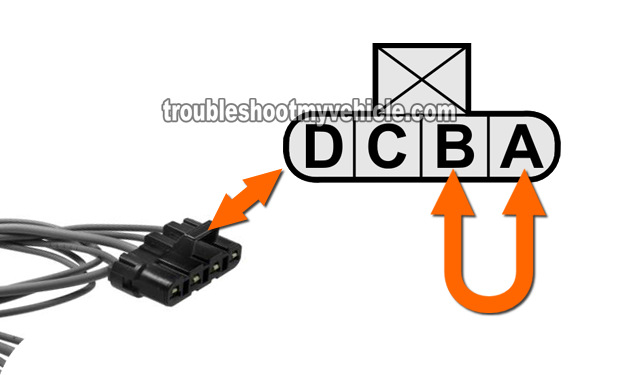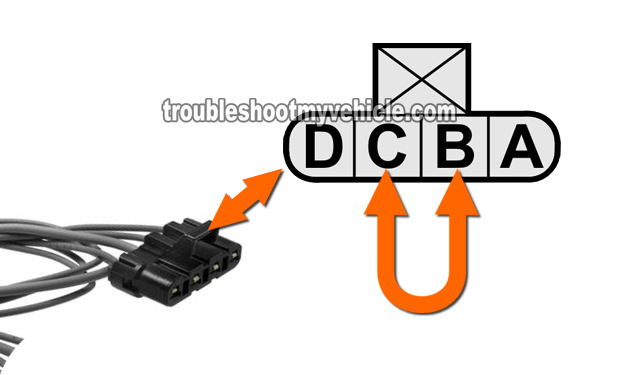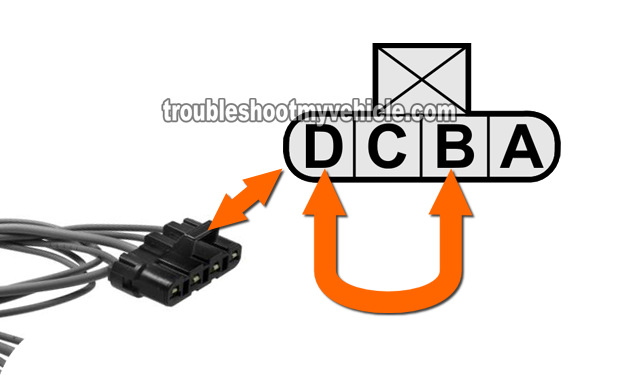TEST 2: Using A Jumper Wire To Bypass The Blower Resistor
Once you've verified that the blower switch is OK (in TEST 1) the next step is to indirectly test the blower resistor by bypassing the resistor with a simple jumper wire.
This is a pretty easy test and the illustrations (in the image viewer) will help guide you to which terminals you'll need to jumper together.
IMPORTANT: The jumper wire you use must be of a small enough diameter (gauge) so that the resistor's connector female metal terminals aren't damaged. If you use a too thick jumper wire, you may permanently open these terminals up and create an intermittent 'open' problem.
Alright, these are the test steps:
- 1
Disconnect the blower resistor from its harness connector and turn the key to the on position (but no need to start the engine).
NOTE: It's a good idea to hook up a battery charger to your pickup's battery while performing the tests and avoid discharging the battery. - 2
Jumper terminals A and B together. This is the circuit that controls blower speed LO.
The correct test result is for the blower motor to run on high speed (it won't run on LO speed because you're bypassing the resistor). - 3
Jumper terminals C and B together. This is the circuit that controls blower speed M1.
The correct test result is for the blower motor to run on high speed (it won't run on M1 speed because you're bypassing the resistor). - 4
Jumper terminals D and B together. This is the circuit that controls blower speed M2.
The correct test result is for the blower motor to run on high speed (it won't run on M2 speed because you're bypassing the resistor).
Let's take a look at what your test results mean:
CASE 1: The blower motor ran when all of the indicated terminals were jumpered together. This tells you several important things:
- That the circuits between the resistor connector and the blower motor are OK.
- That the blower motor relay is OK.
- That the blower resistor is bad and needs to be replaced.
Here's why: Bypassing the blower resistor confirms that the circuit that controls the blower speed that's not working IS working correctly and thus confirms that the blower resistor is fried.
CASE 2: The blower motor DID NOT run when two or all of the indicated terminals were jumpered. This tells you that that specific circuit is bad and that the blower resistor is not bad.
Here's why: Since you have bypassed the blower resistor and the blower fan still did not come on, then the problem resides in the wiring between the resistor connector and the blower motor.
There's a good chance that the blower motor relay is bad or that you have a problem in the wiring (between the connector and the relay or the relay and the blower motor). Although it's beyond the scope of this tutorial to test these circuits, you have eliminated the blower switch (on the A/C-Heater control panel) and the blower resistor as bad.
Related Test Articles
If you enjoyed and/or found this 'How to' article helpful, I have written several more 4.3L, 5.0L, 5.7L specific test articles. You can find them all in this index: GM 4.3L, 5.0L, 5.7L Index Of Articles
Here's a small sample of the articles you'll find there:
- How To Troubleshoot A No Start (GM 4.3L, 5.0L, 5.7L).
- How To Test The 'Spider' Fuel Injector Assembly (4.3L, 5.0L, 5.7L).
- How To Test The Engine Compression (GM 4.3L, 5.0L, 5.7L).
- How To Test The Crank Sensor (GM 4.3L, 5.0L, 5.7L).
- How To Test The GM MAF Sensor 3.1L, 3.4L, 4.3L, 5.0L and 5.7L (at: easyautodiagnostics.com).
- How To Test A Misfire / No Spark-No Start Condition (4.3L, 5.0L, 5.7L 96-04) (at: easyautodiagnostics.com).

If this info saved the day, buy me a beer!




